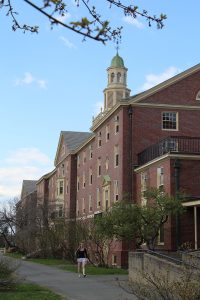 I am in healthcare and can quote ad nauseum the long term effects that alcohol and drug abuse can cause a person. Those pearls of wisdom sometimes seem to fall flat in my house, where there are lots of blank stares and the occasional eye roll when I speak to my college age kids about various topics, but, especially when discussing serious issues such as alcohol abuse. The cautionary tales dredged up from (and occasionally elaborated upon) my youth have all been heard. Even though “Jim” my college friend freshman year who quickly moved from binge drinker to alcohol rehab patient and ex-college student all in the course of 2 semesters was at the time their age, they still hear “Jim” as something that happened a long time ago and not really relatable.
I am in healthcare and can quote ad nauseum the long term effects that alcohol and drug abuse can cause a person. Those pearls of wisdom sometimes seem to fall flat in my house, where there are lots of blank stares and the occasional eye roll when I speak to my college age kids about various topics, but, especially when discussing serious issues such as alcohol abuse. The cautionary tales dredged up from (and occasionally elaborated upon) my youth have all been heard. Even though “Jim” my college friend freshman year who quickly moved from binge drinker to alcohol rehab patient and ex-college student all in the course of 2 semesters was at the time their age, they still hear “Jim” as something that happened a long time ago and not really relatable.
Alcohol use continues to be a challenge for many UMass Amherst students and causes concern among many parents and university staff. Yet, when you are 19, you viscerally believe you will always be 19 or 20 or 21 and look and will feel exactly like you do now — despite all the evidence to the contrary.
Specifically, below are 6 physical changes that can start after just one or two nights of even moderate drinking, let alone 12 hours of nonstop day and night drinking. Ask your student to look in the mirror and consider:
- Dehydration: Alcohol dehydrates your body in general (hence the hangover headache) and this includes your skin. This happens EVERY time you drink and also deprives your skin of vital vitamins and nutrients. Blood shot eyes and face bloat can result from a night of heavy drinking with pimples and rosacea (red skin that can be permanent) not far behind.
- Fat deposits: Many believe that the toxins in alcohol contribute to the buildup of cellulite. In addition, alcohol is fattening. A pint of beer or 2 gin and tonic equals eating around one hamburger with the fixings.
- Body odor: The liver processes most of the alcohol you drink but some of it leaves the body directly through your breath, sweat and urine causing a telltale odor that is difficult to cover up.
- Hair: the dehydrating effect of alcohol also affects your hair making it dry, weak and brittle. Hello split ends! Excessive alcohol use can also trigger a zinc deficiency which has been shown to cause hair loss.
- You may fall asleep more easily after a night of drinking, but you are much more likely to wake up multiple times during the night causing fatigue and sleep deprivation.
- Unhealthy eating: Alcohol is a highly acid forming substance which changes your pH balances causing you to crave salty, fatty foods because your body is trying to find balance -hence the late night Domino calls or McDonald’s trips. Also please refer back to #2 where alcohol contributes to increased cellulite deposits.
In trying to help your student fully grasp the dangers of alcohol abuse, concentrating on the immediate changes in a college student’s body after a night (or a semester) of binge drinking can often get his or her attention. Turns out you don’t have to abuse alcohol for 10 years in dive bars to begin to exhibit some negative physical signs of alcohol abuse. For young adults worried about their looks, letting them know how alcohol abuse will impact their appearance and health can make a challenging topic highly relevant and open up a broader conversation.
Submitted by Shannon Cullagh. Shannon holds a Masters of Physical Therapy degree and is the mom of a UMass sophomore political science major class of 2019.

 I believe that the key to wellness in college is community: ensuring students (our children) develop a healthy, personal community. If students can find that one place that they can belong, whether it be a club, a friend or group of peers where they can be themselves and feel comfortable, they will have planted the seeds for their own community. I want to share my experience.
I believe that the key to wellness in college is community: ensuring students (our children) develop a healthy, personal community. If students can find that one place that they can belong, whether it be a club, a friend or group of peers where they can be themselves and feel comfortable, they will have planted the seeds for their own community. I want to share my experience. As students and families reconnect over winter break, grades are published and students start planning for the Spring semester ahead. Based on recent conversations on the
As students and families reconnect over winter break, grades are published and students start planning for the Spring semester ahead. Based on recent conversations on the  When our son was a junior in high school and we embarked upon the Great College Search, he informed us he would like to study computational linguistics (yes- we had to look up that one, too) and go to a campus with rolling hills north of the Mason-Dixon line and east of the Mississippi. We poured over websites, hunting down schools with that elusive major (hint- there are not very many) and his geographical criteria. We did the Midwest road trip: ten colleges, four states, six days. And just like the guidebooks tell you to do, he narrowed it down to four solid matches, none of which were UMass.
When our son was a junior in high school and we embarked upon the Great College Search, he informed us he would like to study computational linguistics (yes- we had to look up that one, too) and go to a campus with rolling hills north of the Mason-Dixon line and east of the Mississippi. We poured over websites, hunting down schools with that elusive major (hint- there are not very many) and his geographical criteria. We did the Midwest road trip: ten colleges, four states, six days. And just like the guidebooks tell you to do, he narrowed it down to four solid matches, none of which were UMass. Although it is only November, many students around the nation are pitching the idea of moving into an apartment to their parents and family members for the fall semester. With 15,000 on campus beds at UMass Amherst, any student that wants to stay on campus can usually be accommodated. However, many students want more space and freedom with some moving off campus sophomore year and others waiting until junior or senior year.
Although it is only November, many students around the nation are pitching the idea of moving into an apartment to their parents and family members for the fall semester. With 15,000 on campus beds at UMass Amherst, any student that wants to stay on campus can usually be accommodated. However, many students want more space and freedom with some moving off campus sophomore year and others waiting until junior or senior year. Does your student want to study abroad? The range of choices and the number of details that need to be considered are almost overwhelming at first; however, the
Does your student want to study abroad? The range of choices and the number of details that need to be considered are almost overwhelming at first; however, the  To our surprise our son was not accepted to UMass in the fall of his would be freshman year. He was waitlisted for the spring semester. This came as a shock to us all at first but ended up being the best thing that could have happened.
To our surprise our son was not accepted to UMass in the fall of his would be freshman year. He was waitlisted for the spring semester. This came as a shock to us all at first but ended up being the best thing that could have happened.